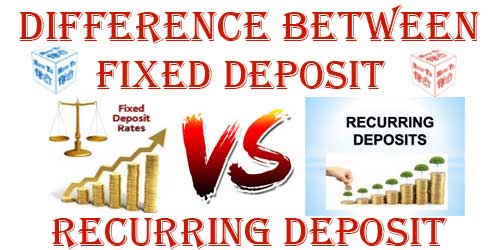| Home » Files » Investing |
Know the Difference Between FD and RD Interest Rates
| 05-December-2017 | |
|
Both Fixed Deposits and Recurring Deposits generate different amounts at the end of the maturity period, based on the interest rates and the amount invested. However, a number of investors are usually confused between the two. It can be hard to choose between an FD and an RD, especially as investment is no trivial matter for anyone. Prior to investing, you can calculate interest rates on FD as well as recurring deposits by making use of an FD rate calculator, or a recurring deposit calculator. This will help you understand the difference in the returns generated by both schemes at the end of tenure. Here’s a nifty guide that’ll help you understand the true difference between the two options, and how to use this knowledge to your advantage:  1. Ascertain your Financial Goals A recurring deposit is a term deposit, which means that you’ll be making periodic investments (i.e) regular, time-based deposits. You’d normally use it for a short term investment, especially if you have smaller amount to save. Fixed Deposits, on the other hand, involve investing a lump sum amount at the beginning of the term, and gathering uniform interest over the course of time period. If you have a relatively smaller amount to spare, you can opt for a recurring deposit scheme. To make sure that things are in order, you can ensure that you stay up-to-date with the interest being charged using an FD Interest rate calculator. This way, you will avoid nasty surprises and/or disappointments at the end of tenure. You’ll know what exactly to expect. 2. Tenure of the Deposits Both Fixed and Recurring Deposits are offered for a predetermined tenure, based on your financial needs. For Recurring Deposits, this tenure ranges from 6 months to a maximum of 10 years. In case of Fixed Deposit investments, this number varies depending on your bank or financial institution. It starts at a minimum of 7 days, and extend all the way up to a maximum period of 30 years. Experienced investors usually suggest opting for both the schemes if possible, since the interest returns would be different. When you invest in both scenes, you can choose the tenure by first determining the finances at hand. Then, you can make use of a Term Deposit Interest Rates Calculator to gauge the returns you will receive at the end of the maturity period. 3. Difference in Calculation of Interests When you compare Fixed Deposit rates with those of Recurring Deposit investments, you would notice that Fixed Deposits yield better returns for the most part. This is because the interest on Fixed Deposit investments is calculated at the end of every 12 months, whereas interests on Recurring Deposits are calculated quarterly. Let’s say, you‘ve invested Rs.24,000 in an FD scheme and Rs.2,000/month- in a Recurring Deposit. Assume interest is compounded at 9% on both schemes. After a year, the interest on your FD would be Rs.26,324, whereas you’d earn a return of Rs.25,195 on the Recurring Deposit. There is a significant difference of Rs.1,039. On your RD, the first instalment earns an interest for 12 months. After this, the rate and gradually decreases, thereby reducing the overall return on the deposit. On the FD, interest rates don’t take a ‘hit’ every year; subsequently, you earn better returns overall. You can use a FD interest rates calculator to check the numbers before actually investing. 4. Tax Deductions at Source[b] If your return is over Rs.10,000, then it is taxed as a Tax Deduction at Source (TDS) of 10%. If you aren’t part of the ‘taxable income’ slab, you can file Form 15G to avoid TDS being deducted from your RDs. Make sure you do this, or you’ll end up paying taxes you didn’t need to—that’s rather against the whole point of investing. Both FDs and RDs are considered safe investments by experienced investors. Both offer promising returns as well. Depending on your needs, you can use the knowledge you just gained to choose between Fixed or Recurring Deposit schemes. There’s no ‘one right answer’ when picking between these popular modes of investment. Take a look at what you need, and compare the various parameters we’ve enlisted in this article. Then, you can make the right decision. | |
| Views: 298 | Downloads: 0 | | |
| Total comments: 0 | |
